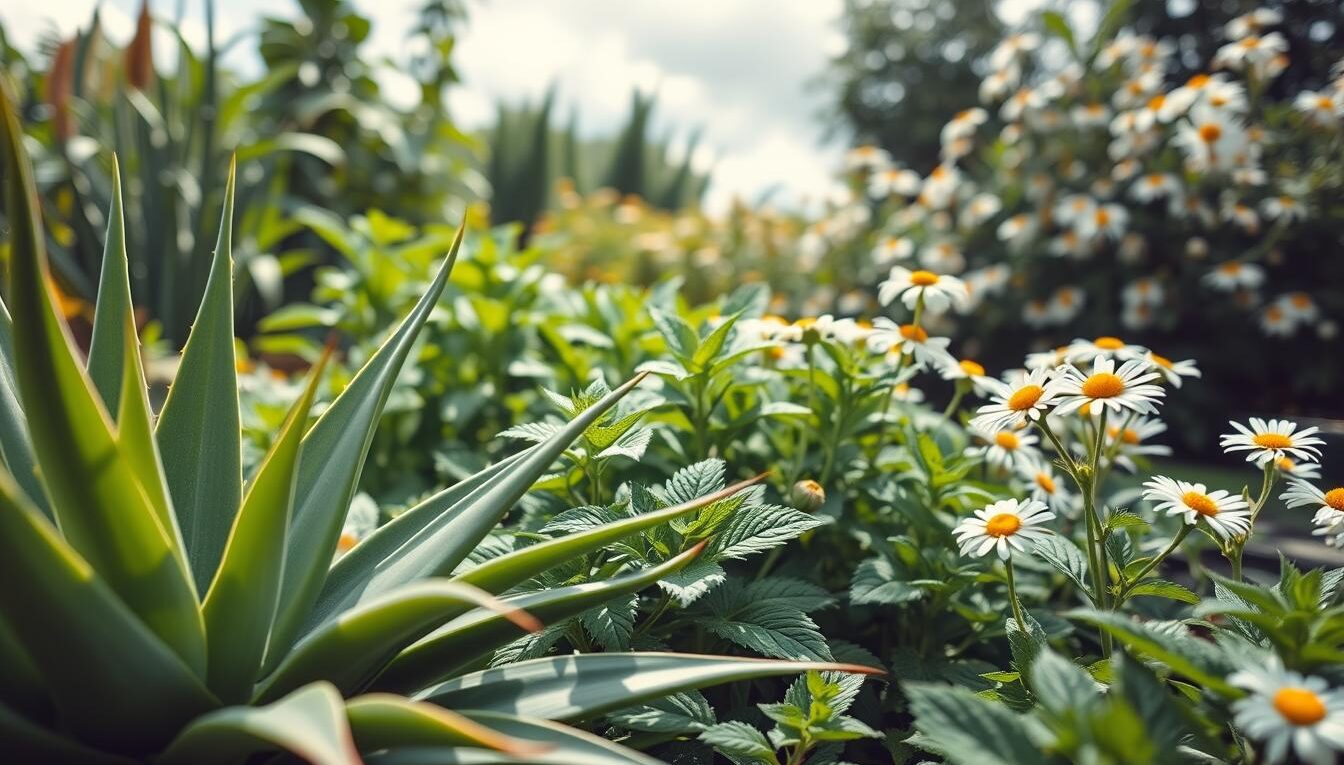Digestive-Friendly Plants for Better Wellness
Maintaining a healthy digestive system is crucial for your overall wellness. Certain plants have been found to play a significant role in supporting digestive health, making them a valuable addition to your diet.
By incorporating digestive-friendly plants into your daily routine, you can promote a balanced gut and enhance your body’s natural detoxification processes. These plants not only support digestion but also contribute to a healthier you.
Key Takeaways
- Digestive-friendly plants support gut health.
- Certain plants aid in natural detoxification.
- Incorporating these plants can enhance overall wellness.
- A healthy digestive system is key to general wellness.
- Nourishing your body with the right plants can make a significant difference.
Understanding the Connection Between Plant-Based Foods and Digestive Health
A growing body of evidence suggests that plant-based foods are key to supporting digestive health and promoting a balanced gut microbiome. This connection is rooted in the unique nutrients and compounds found in plants, which play a crucial role in maintaining a healthy digestive system.
How Plant Fiber and Phytonutrients Support Your Digestive System
Plant fiber is a critical component of a healthy diet, as it helps regulate bowel movements and prevent constipation. Additionally, phytonutrients found in plants have anti-inflammatory properties that can soothe the digestive tract and promote healing. These nutrients work together to create a supportive environment for beneficial gut bacteria to thrive.
The Science Behind Plant Compounds and Gut Microbiome Balance
The gut microbiome is a complex ecosystem that is influenced by the foods we eat. Plant compounds, including prebiotic fibers and polyphenols, help nourish beneficial bacteria, promoting a balanced gut microbiome. This balance is essential for a strong immune system and overall health. Research has shown that an imbalance in the gut microbiome, also known as dysbiosis, can lead to various health issues, including digestive disorders.
Why Your Digestive Health Affects Overall Wellness
Digestive health is closely linked to overall wellness, as the gut plays a significant role in nutrient absorption and immune function. A healthy digestive system is essential for maintaining energy levels, supporting mental health, and preventing chronic diseases. By focusing on plant-based foods, you can take a proactive approach to supporting your digestive health and promoting overall wellness.
Plants That Help with Digestion and General Wellness
Incorporating the right plants into your diet can significantly improve your digestive health and overall wellness. Certain plants are known for their digestive benefits, ranging from fiber-rich varieties to those with anti-inflammatory properties.
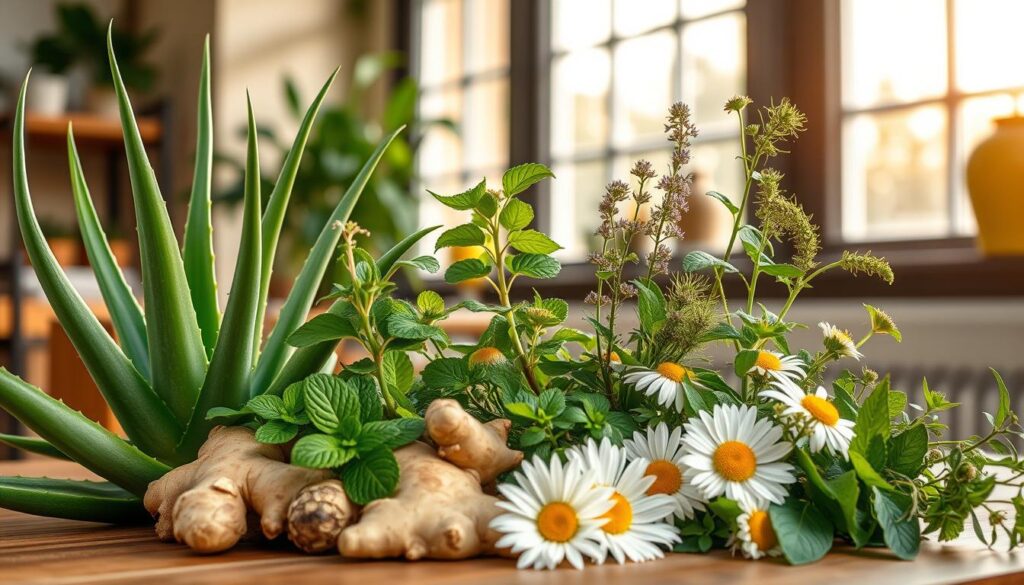
Fiber-Rich Plants That Regulate Digestive Function
Fiber-rich plants are essential for maintaining a healthy digestive system. They help regulate bowel movements and prevent constipation. Some examples include legumes like beans and lentils, whole grains such as oats and barley, and vegetables like broccoli and carrots. These foods are not only high in fiber but also rich in nutrients that support overall health.
Anti-Inflammatory Plants That Calm Digestive Distress
Some plants have anti-inflammatory properties that can help soothe digestive distress. Turmeric, with its active compound curcumin, is well-known for its anti-inflammatory effects. Other examples include ginger, which can help reduce nausea and inflammation, and licorice root, which can soothe the digestive tract. Incorporating these plants into your diet can help calm digestive issues.
Prebiotic Plants That Nourish Beneficial Gut Bacteria
Prebiotic plants are rich in fibers that feed the good bacteria in your gut, promoting a healthy gut microbiome. Foods like asparagus, bananas, and onions are good sources of prebiotics. By nourishing beneficial gut bacteria, these plants support a strong immune system and overall digestive health.
Adaptogenic Plants That Balance Digestive Stress Responses
Adaptogenic plants help your body adapt to stress, which can positively impact your digestive system. Ashwagandha is an adaptogen that can help reduce stress-related digestive issues. Other adaptogens like holy basil and rhodiola can also support digestive health by balancing your body’s response to stress.
By incorporating these plants into your diet, you can support your digestive health and enhance your overall wellness. Whether through fiber-rich foods, anti-inflammatory herbs, prebiotic-rich vegetables, or adaptogenic plants, there’s a variety of options to choose from to suit your needs.
Powerful Herbs That Soothe Digestive Discomfort
When it comes to soothing digestive discomfort, nature has provided us with an array of powerful herbs. These natural remedies have been used for centuries to alleviate various digestive issues, from bloating and gas to nausea and IBS. Incorporating these herbs into your daily routine can significantly improve your digestive health and overall well-being.
Peppermint: Nature’s Antispasmodic for IBS and Bloating
Peppermint is well-known for its antispasmodic properties, making it an effective herb for relieving IBS symptoms and bloating. The menthol in peppermint helps relax the muscles in the digestive tract, reducing cramps and discomfort. You can enjoy peppermint tea, add fresh leaves to your salads, or use peppermint oil in capsules.
Ginger: The Ancient Anti-Nausea and Motility Enhancer
Ginger has been a staple in traditional medicine for its anti-nausea properties and its ability to enhance digestive motility. It helps stimulate digestion, reduce nausea, and alleviate bloating. Ginger can be consumed as tea, added to meals, or taken in supplement form.
Chamomile: Calming Inflammation in the Digestive Tract
Chamomile is renowned for its calming effects, not just on the mind but also on the digestive system. It has anti-inflammatory properties that can soothe the digestive tract, reducing inflammation and discomfort. Drinking chamomile tea is a gentle way to promote digestive relaxation.
Fennel and Caraway: Traditional Gas-Relieving Herbs
Fennel and caraway seeds have been traditionally used to relieve gas and bloating. They work by relaxing the muscles in the stomach and intestines, allowing trapped gas to be released. You can chew on the seeds after meals or drink fennel tea to benefit from their carminative properties.
By incorporating these powerful herbs into your diet, you can naturally alleviate digestive discomfort and promote a healthier digestive system. Whether you prefer teas, capsules, or adding fresh herbs to your meals, there’s a variety of ways to enjoy the benefits of these digestive-friendly plants.
Vegetables That Promote Healthy Digestion
A diet rich in vegetables can help alleviate digestive issues and promote overall wellness. Vegetables are packed with fiber, vitamins, and minerals that support a healthy gut microbiome.
Leafy Greens: Spinach, Kale, and Arugula’s Digestive Benefits
Leafy greens like spinach, kale, and arugula are rich in magnesium and fiber, which can help relax the digestive tract and promote regular bowel movements. These greens also contain antioxidants that reduce inflammation in the gut.
- Spinach is rich in magnesium, which helps regulate bowel movements.
- Kale contains fiber, which supports the growth of beneficial gut bacteria.
- Arugula’s antioxidants help reduce inflammation in the digestive tract.
Cruciferous Vegetables: Broccoli, Cauliflower, and Cabbage for Detoxification
Cruciferous vegetables such as broccoli, cauliflower, and cabbage contain sulforaphane, which supports the body’s natural detoxification processes. These vegetables also contain fiber, which helps regulate bowel movements and prevent constipation.
Key benefits:
- Broccoli’s sulforaphane supports liver function and detoxification.
- Cauliflower’s fiber helps regulate bowel movements.
- Cabbage contains antioxidants that reduce inflammation in the gut.
Root Vegetables: Sweet Potatoes, Carrots, and Beets for Gut Health
Root vegetables like sweet potatoes, carrots, and beets are rich in fiber and antioxidants, which help soothe the digestive tract and promote a healthy gut microbiome.
For example, sweet potatoes are high in fiber and vitamins, making them an excellent choice for supporting digestive health.
Fermented Vegetables: Kimchi and Sauerkraut for Probiotic Support
Fermented vegetables like kimchi and sauerkraut are rich in probiotics, which support the growth of beneficial gut bacteria. These vegetables can help alleviate digestive issues like bloating and gas.
Incorporating fermented vegetables into your diet can be as simple as adding kimchi to your meals or snacking on sauerkraut.
Fruits That Aid Digestion and Cleanse Your System
Eating the right fruits can be a simple yet effective way to support your digestive health and overall well-being. Fruits are packed with nutrients, fiber, and antioxidants that can help regulate digestion, reduce inflammation, and promote a balanced gut microbiome.
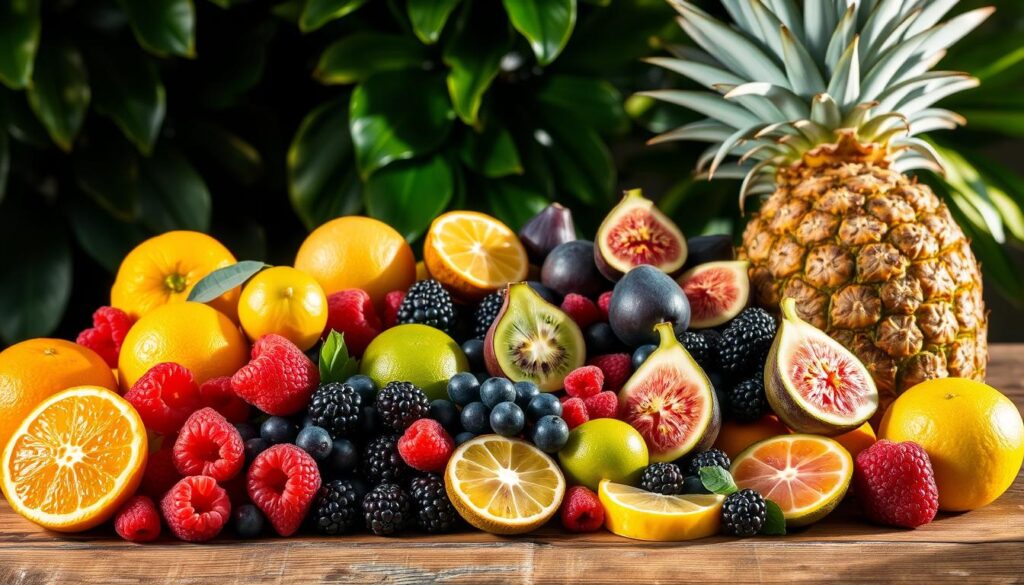
Berries: Antioxidant Powerhouses That Reduce Gut Inflammation
Berries such as blueberries, strawberries, and raspberries are rich in antioxidants and fiber, making them excellent for reducing gut inflammation and promoting digestive health. Their high antioxidant content helps protect the digestive tract from damage caused by free radicals.
Papaya and Pineapple: Natural Digestive Enzymes for Protein Breakdown
Papaya and pineapple are notable for containing digestive enzymes like papain and bromelain, which aid in protein breakdown and enhance digestion. These enzymes help reduce symptoms of indigestion and bloating.
Apples and Pears: Pectin-Rich Digestive Regulators
Apples and pears are rich in pectin, a type of soluble fiber that acts as a prebiotic, nourishing beneficial gut bacteria. This can help regulate bowel movements and improve overall digestive health.
Bananas and Avocados: Soothing Fruits for Sensitive Digestive Systems
Bananas are easy to digest and can help soothe the digestive tract, making them a great option for individuals with sensitive stomachs. Avocados, while often thought of as a vegetable, are a fruit that provides healthy fats and fiber, supporting digestive health and satiety.
Incorporating these fruits into your diet can be a delicious way to support your digestive system. Whether you enjoy them as snacks, add them to your meals, or blend them into smoothies, these fruits can play a significant role in maintaining a healthy and balanced digestive system.
Incorporating Digestive-Friendly Plants into Your Daily Diet
To support your digestive health, it’s essential to include a variety of plant-based foods in your daily meals. By doing so, you can promote a healthy gut microbiome and enhance your overall wellness.
Simple Meal Ideas That Combine Digestive-Supporting Plants
Start by incorporating simple meal ideas into your diet. For example, you can add spinach to your omelets or salads, or include ginger in your stir-fries. Fiber-rich plants like broccoli and carrots can be steamed as a side dish or added to soups.
Smoothies and Juices: Recipes for Optimal Digestive Health
Smoothies and juices are an excellent way to consume digestive-friendly plants. Try blending papaya and pineapple for a digestive enzyme boost, or juice kale and apple for a nutrient-rich drink.
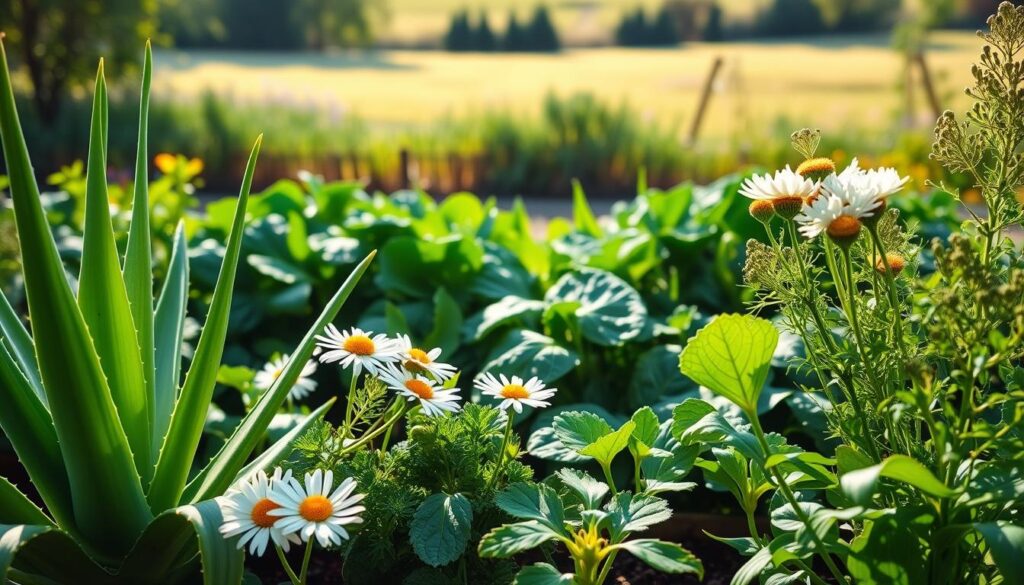
Herbal Teas and Infusions That Support Your Digestive System
Herbal teas like peppermint and chamomile can soothe digestive discomfort. Enjoy a warm cup after meals to promote relaxation and support your digestive system.
Creating a Balanced Plate for Digestive Wellness
A balanced plate should include a mix of fiber-rich vegetables, lean proteins, and whole grains. By doing so, you can create a holistic detox technique that supports your digestive wellness and overall health.
Creating a Natural Detoxification Plan with Digestive Plants
A well-planned detoxification plan using digestive plants can help revitalize your digestive system and enhance overall health. By incorporating specific plants into your diet, you can support your body’s natural detoxification processes and promote a healthier you.
How Plants Support Your Body’s Natural Detoxification Pathways
Plants play a crucial role in supporting the body’s natural detoxification pathways. Certain plants are rich in fiber, which helps to cleanse the digestive tract, while others contain phytonutrients that support liver function and overall detoxification.
Fiber-rich plants like leafy greens and cruciferous vegetables help regulate bowel movements and prevent the buildup of toxins in the digestive system. Meanwhile, antioxidant-rich plants like berries and green tea support the liver’s natural detox processes.

A 7-Day Plant-Based Gentle Detox Plan
Implementing a 7-day plant-based detox plan can be a great way to kickstart your journey to better digestive health. Here’s a simple plan to follow:
- Day 1-2: Increase your intake of leafy greens and fiber-rich vegetables.
- Day 3-4: Incorporate antioxidant-rich fruits like berries and citrus fruits.
- Day 5-7: Drink herbal teas like peppermint and chamomile to soothe your digestive system.
Signs Your Body Is Responding to Plant-Based Detoxification
As you embark on your plant-based detox journey, there are several signs to look out for that indicate your body is responding positively. These include:
| Signs | Description |
|---|---|
| Improved Digestion | Reduced bloating and gas, regular bowel movements. |
| Increased Energy | Feeling more energized and less fatigued. |
| Clearer Skin | Reduced acne and improved skin complexion. |
Combining Hydration with Plant Power for Enhanced Cleansing
Adequate hydration is crucial when following a detox plan. Drinking plenty of water helps to flush out toxins and support the digestive system. Combining hydration with plant power can enhance the cleansing process.
For example, drinking lemon water in the morning can help stimulate digestion, while sipping on herbal teas throughout the day can support the body’s natural detox processes.
Common Digestive Issues and the Plants That Can Help
If you’re struggling with digestive issues, you’re not alone. Many people face challenges with bloating, acid reflux, constipation, and inflammatory bowel conditions. Fortunately, nature offers a variety of plants that can help alleviate these common digestive problems.
Plants for Bloating, Gas, and Abdominal Discomfort
Certain plants are known to ease bloating and gas. For example, peppermint oil capsules can help relax the muscles in your stomach and reduce symptoms of IBS. Ginger has natural anti-inflammatory properties that can soothe the digestive tract. Fennel seeds are another traditional remedy for gas and bloating.
- Peppermint
- Ginger
- Fennel seeds
Natural Plant Remedies for Acid Reflux and Heartburn
For acid reflux and heartburn, plants like aloe vera and slippery elm can provide relief. Aloe vera juice can help reduce inflammation in the esophagus, while slippery elm forms a protective barrier on the lining of the digestive tract.
Key plants for acid reflux:
- Aloe vera
- Slippery elm
Plant-Based Solutions for Constipation and Irregular Bowel Movements
Plants rich in fiber, such as chia seeds and psyllium husk, can help regulate bowel movements. Prunes are another natural laxative that can aid in relieving constipation.
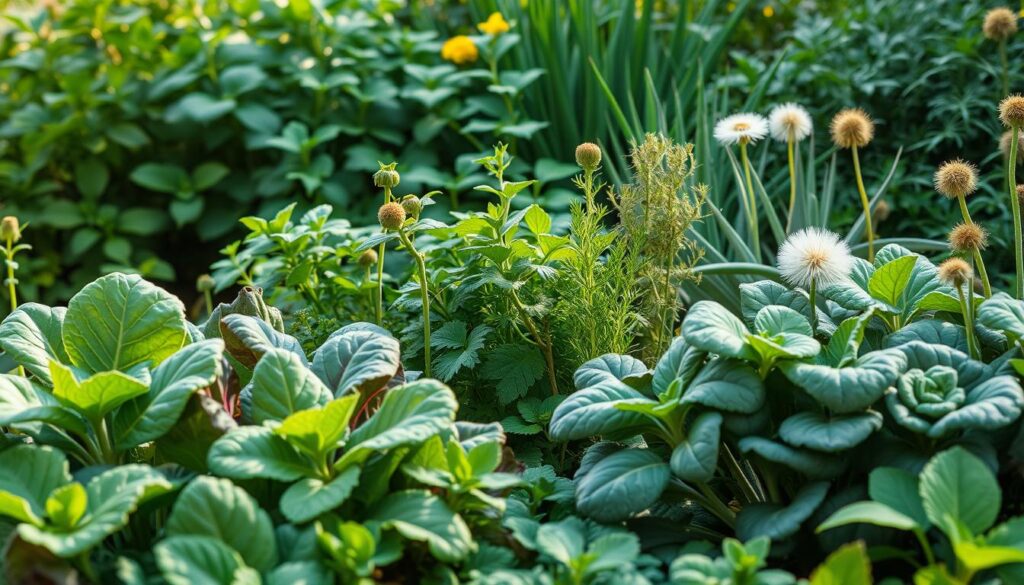
Soothing Plants for Inflammatory Bowel Conditions
For conditions like Crohn’s disease and ulcerative colitis, plants with anti-inflammatory properties can be beneficial. Turmeric contains curcumin, which has potent anti-inflammatory effects. Licorice root is another herb that can help soothe the digestive tract.
Beneficial plants:
- Turmeric
- Licorice root
Conclusion: Embracing Plant Power for Digestive Wellness
By incorporating digestive-friendly plants into your diet, you can significantly improve your digestive wellness and overall health. The plants discussed throughout this article offer a natural and effective way to support your digestive system, from soothing discomfort to promoting a balanced gut microbiome.
To harness the benefits of plant power, start by making simple changes to your daily meals. Add fiber-rich vegetables, anti-inflammatory herbs, and prebiotic fruits to your diet. As you explore the world of digestive-friendly plants, you’ll discover a variety of delicious and nutritious options to enhance your digestive health.
Embracing a plant-based approach to digestive wellness is a journey, and every small step counts. By choosing to detox your body naturally at home with the power of plants, you’re taking control of your health and paving the way for a happier, healthier you.


